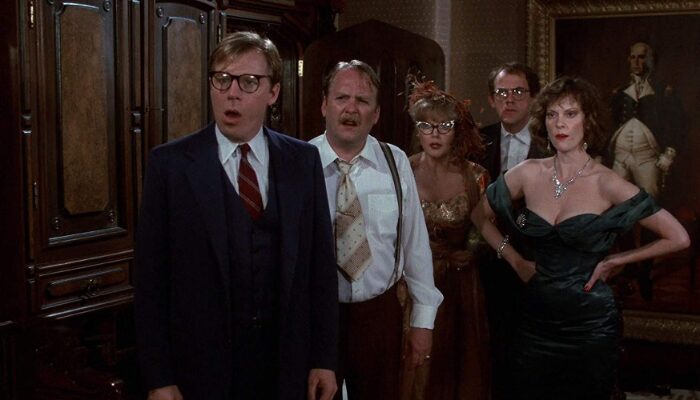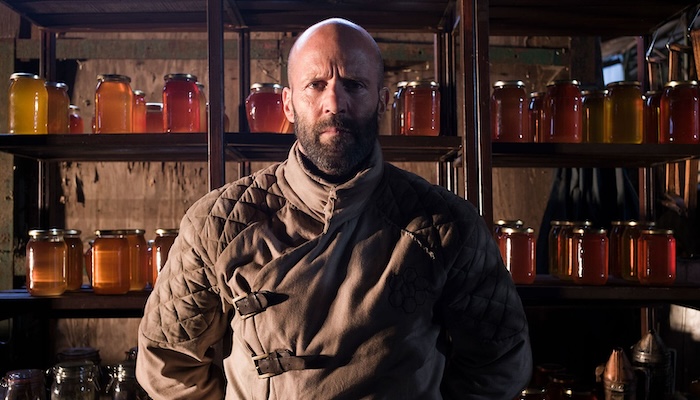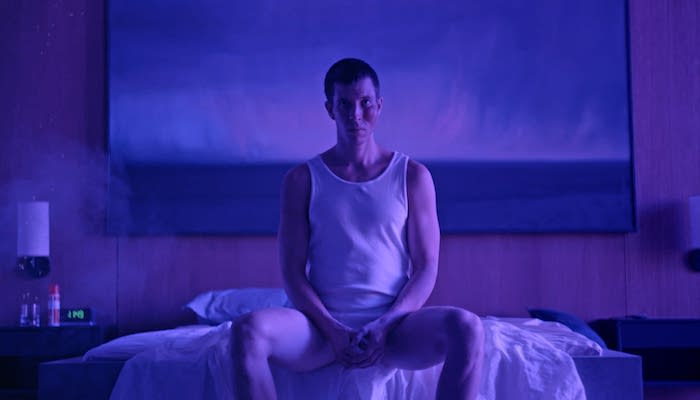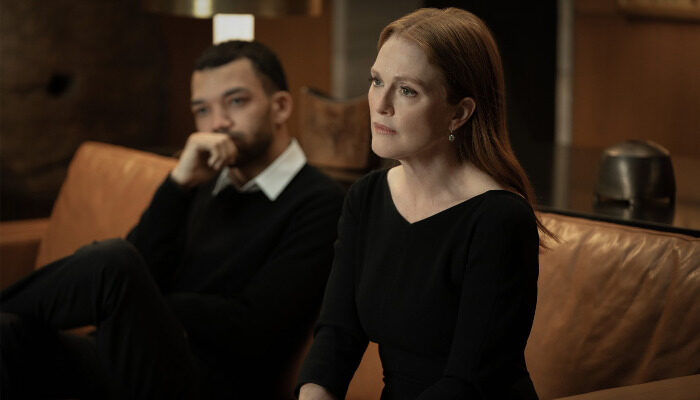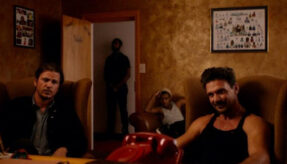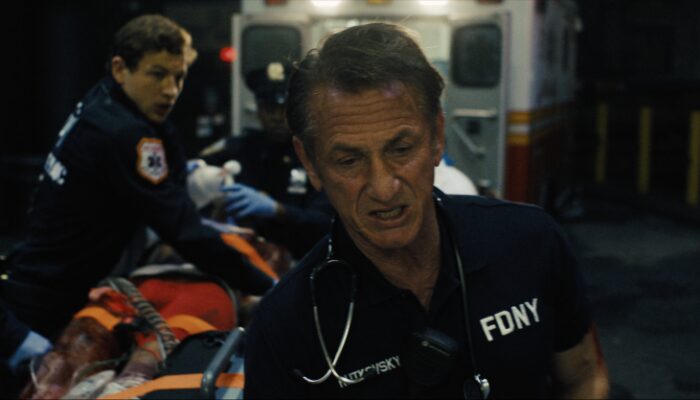Film Review: MOSQUITO STATE (2020): Impressive Imagery with a Cryptic Story
Mosquito State Review
Mosquito State (2020) Film Review, a movie directed by Filip Jan Rymsza, and starring Beau Knapp, Charlotte Vega, Jack Kesy, Olivier Martinez, Audrey Wasilewski, Daisy Bishop, Dominika Kachlik, Krystin Goodwin, Kelly Dean Cooper, Carolina Espiro, Mark McKinnon, and Blaise Corrigan.
In Mosquito State, director/writer Filip Jan Rymsza offers a gorgeous but unsettling look into the eccentric life of a shy, obsessive Wall Street data forecaster, Richard Boca (Beau Knapp) through the eyes of a fledgling adult mosquito. She buzzes her way through sewers and air ducts, emerging into a black-tie soiree cum quarterly meeting of a Wall Street brokerage firm. Standing apart from the poised company, Richard furtively gouges out a round slice from the center of a birthday cake.
We watch as the mosquito targets him, dive-bombs like a kamikaze, and bites the back of his neck. Then followed by a friendly hail from a handsome pair across the room: his boss, Edward (Olivier Martinez) and a young woman, Lena (Charlotte Vega). Richard, offbeat and mute, piques Lena’s curiosity. We learn that Boca is Edward’s “golden goose,” having designed a uniquely accurate financial forecasting model.
Boca, however, is as bad at small talk as he is at cake slicing; he doesn’t respond at the most obvious devices to draw him into the conversation. Richard is one of those that could be described in popular lingo as being “on the spectrum” and usually steers clear of corporate social functions. He finally makes an appearance on this occasion on account of his birthday.
Still without a word, Richard manages to coax Lena back to his flat (an entire floor on Central Park), and carries the mosquito under his collar. Richard finally speaks, in halting, sometimes confusing phrases, but they get on just fine until he wanders into his bedroom and buries his face, weeping and groaning.
Exit Lena, until they meet again, much later.
In the meantime, the mosquito bite propels Richard into a peculiar psychological journey, evidently yoked to the mosquito who hitched a ride under his collar. The bite develops into something beyond the annoying itch; his face develops spots of swelling that his coworkers comment on but dismiss.
At about this point, Richard’s cognition–already on shaky ground–begins to unravel. Unfortunately, the story line goes along. It’s hard to say where Rymsza wants to go with all the subsequent transformations, which somehow is meant to correlate with the mosquito life-cycle stages, even to naming the sections after them.
Richard turns his home into a virtual incubator, turning the air tropical, placing vessels of standing water next to platters of mashed up fruit. Does he consider himself to be a nurturing drone as a result of the original bite? Okay, why not? Whatever the reason, it works. Soon there are billowing clouds of mosquitoes that, according to him, obey his will and commands, and he encourages the emerging adults to feed on him.
There also a strong correlation implied between his mental disintegration at home and his rebellion in the office, claiming that his model has been corrupted, leading to dire consequences. He challenges his colleagues when they insist his claim is groundless, and a shouting match leads to altercation. Eventually his secretary, Sally (Audrey Wasilewski)–as a stand-in for the audience, is my guess–pleads with him to explain what’s happening. (PS: He doesn’t.)
On the sly, Richard replaces the “golden goose” data model with a supposedly corrected one that he churned out over a couple of days.
Okay. Now back to Lena. She hasn’t returned his frantic phone calls since that first night. He tracks her down at a wine bar given to her by her sugar daddy, Edward. She demands Richard stop calling her. He tells her not to let Edward “control her,” apparently confrontation enough for her to wind up back at Richard’s flat. After some casual exchange, she sleeps with him (I guess), despite all the swellings and welts from the feedings.
She wakes up later to find Richard gone and paperwork lying on the coffee table giving her his flat. She stands at the window overlooking Central Park and watches Richard submerging himself in the lake below, where he strides across the bottom, releasing adult mosquitoes swimming to the surface.
While I can’t give Mosquito State the highest marks in terms of clear narrative, the film mounts an emotional pitch that heralds Rymsza as an innovative artist. And by the same token the actors deserve their fair share of credit. In particular, Knapp brings definite charm to Boca’s twitchy awkwardness, and Vega’s confident Lena is endearingly empathetic.
The work behind the camera is equally impressive. Without a doubt, the powerful imagery is undeniable, elegant and often beautiful, even at its creepiest (the footage of the mosquito’s life-cycle is both fascinating and unsettling), and the final scene lingers in the memory.
Presenting narrative abstraction has consistently been a challenge and something of a risk in any medium, but especially in film. The potential is higher, and so are the stakes. Sometimes less is more, as the saying goes. David Cronenberg’s rendition of The Fly, for example illustrates a similar theme using concrete, linear storytelling that still preserves emotional depth.
As a final word, this team of artists (notice that the closing credits are grouped according to function as teams, a splendid notion), especially Rymsza, bears watching, and despite its shortcomings, so does this film.
Rating: 7/10
Leave your thoughts on this Mosquito State review and the film below in the comments section. Readers seeking to support this type of content can visit our Patreon Page and become one of FilmBook’s patrons. Readers seeking more film reviews can visit our Movie Review Page, our Movie Review Twitter Page, and our Movie Review Facebook Page. Want up-to-the-minute notifications? FilmBook staff members publish articles by Email, Twitter, Facebook, Instagram, Tumblr, Pinterest, Reddit, and Flipboard.
Related Articles
FilmBook's Newsletter
Subscribe to FilmBook’s Daily Newsletter for the latest news!





